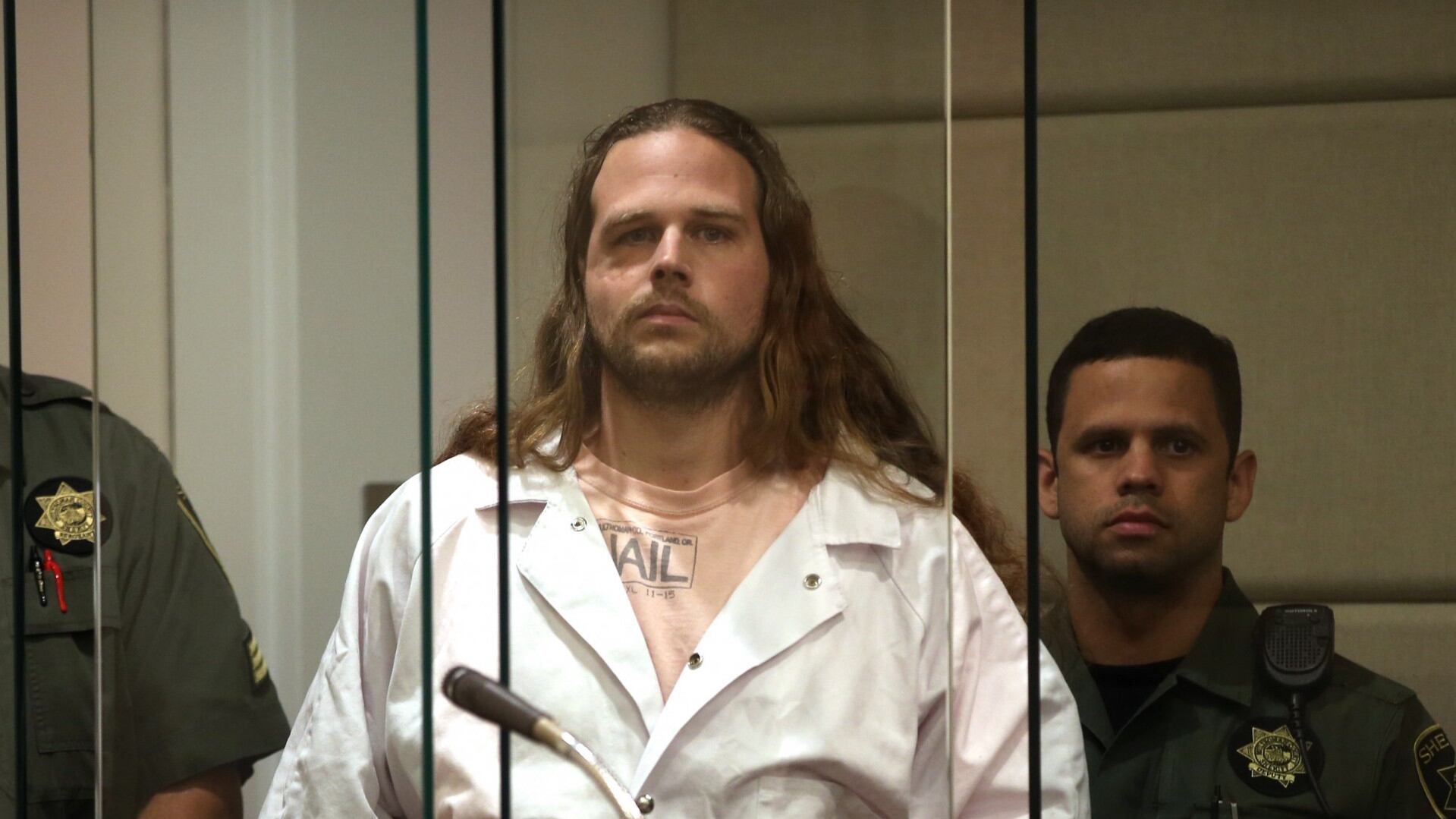When the murder trial of Jeremy Christian begins next week in Multnomah County Circuit Court, it will include little dispute about what he did aboard a crowded MAX train car May 26, 2017.
Dozens of witnesses watched him fatally stab two men and wound another, after the men stopped him from racially taunting two African American girls, one of whom wore a hijab. Other passengers shot video of the killings.
Minutes later, Christian himself explained his actions succinctly in a taped statement in the back of a Portland police squad car. "Think I stab motherfuckers in the neck for fun?" he asked. "Oh yeah, you're right I do. I'm a patriot."
That doesn't leave his defense attorneys a lot of wiggle room. But court filings from recent weeks hint at what their case could look like: The defense is likely to argue Christian was defending himself in a politically charged fight—the kind that have become increasingly common in Portland.
Micah Fletcher, the only one of Christian's victims to survive, is an antifascist activist who shoved Christian twice after Christian shoved another man. Christian then pulled out a knife and taunted Fletcher, court filings say, telling him, "Go on! Hit me again!" After that, Fletcher shoved Christian a third time.
Defense lawyers could, in effect, argue Christian was attacked by antifa.
That's a potentially explosive argument, one that risks retraumatizing Fletcher and the dead men's families and turning the trial into a political circus.
Christian's attorneys declined to comment. But observers say it's a strategy they anticipate.
"I believe they're going to try to argue that he stabbed the people in self-defense. That's, I think, going to be their primary defense," says Andy Green, a criminal defense lawyer.
"You could make it in good faith, and I wouldn't doubt if they tried," says Brandon Mayfield, a trial lawyer, of the self-defense argument. "But I don't think that's going to stick. If someone comes at you with a fly swatter and you respond with a knife, it would be nearly impossible to argue your response was proportional."
Lindsay Schubiner, a program director for the Western States Center, which tracks political extremism in the Pacific Northwest, finds that possibility disturbing.
"Arguing self-defense and pointing the finger at anti-fascists would be an insulting response to the murder of two people and the wounding of a third," Schubiner says. "No person or group made Christian carry a knife, harass and threaten his fellow riders and ultimately murder two people."
But self-defense gives Christian's attorneys a sliver of hope for acquittal. In such a case, Green says, the prosecution has the burden of proving Christian didn't reasonably fear his life was in danger.
Civil rights and criminal defense lawyer Erious Johnson agrees. "What's going through his head?'" Johnson asks. "Was he like, 'I'm fixing to kill these people,' or, 'There's force coming at me that I need to defend myself from'?"
Court filings show prosecutors want to establish that Christian's actions were premeditated.
The Multnomah County District Attorney's Office filed a motion in December to admit video footage of Christian the day prior to the attack in which he espouses similar hostility toward a woman on a MAX train.
The woman pepper-sprayed Christian after he followed her off the train, and he threw a 32-ounce Gatorade bottle that hit her in the face. Another passenger recorded video of the incident on her cellphone.
The video captures Christian describing actions similar to those he would take the following day.
"I'll stab you too, bitch, move forward. Move forward, MAX driver. Fuck you. I'm about to stab some motherfuckers," Christian is recorded saying May 25.
Prosecutors say this cancels out any claim of self-defense.
"This evidence is consistent with the state's theory that defendant…created an anticipated plan of attack against any of those individuals which included stabbing them in the neck, and, ultimately, that the stabbing of Micah Fletcher, Ricky Best, and Taliesin Namkai-Meche was not an act of self-defense, but rather, an intentional act committed by the defendant," the prosecution's motion says.
Multnomah County Circuit Judge Cheryl Albrecht hasn't ruled on the motion. Green says her ruling could be key to how the trial unfolds.
"If there's evidence that yesterday he's saying, 'I'm going to stab people on the MAX,' that would negate his self-defense claim," Green says.
Johnson says prosecutors need to present a more subtle argument: that Christian created a scene to stir up controversy and incite violence so he could kill.
Johnson says such behavior mirrors the actions of right-wing protesters Christian tagged along after on previous occasions—groups whose members repeatedly made spectacles of themselves to provoke fights.
The Christian trial mirrors another racially charged, high-profile case from last year: the killing of Larnell Bruce Jr., a black teenager run down by a white supremacist in a Jeep outside a 7-Eleven. The killer convicted in that case, Russell Courtier, received a life sentence even though his attorneys argued self-defense.
Not everyone thinks Christian's trial will include much suspense. Veteran criminal defense lawyer Laura Graser says she doesn't find his case all that interesting, forensically speaking.
"This is just a garden-variety, horrible murder case," Graser says. "If you're in this line of work, it's just kind of cookie-cutter."
Jury selection for Christian's trial begins Tuesday, Jan. 21.

